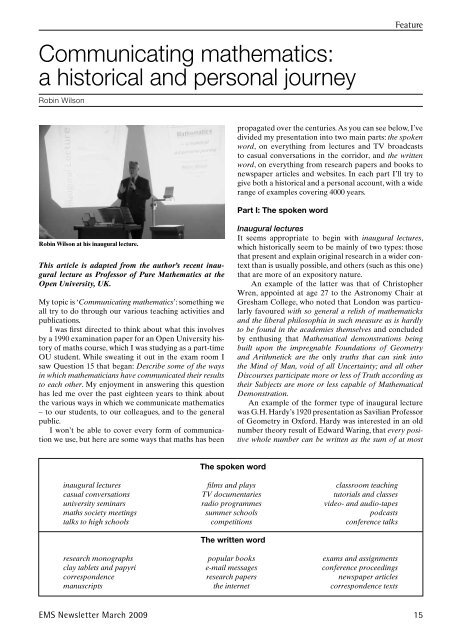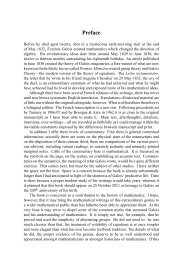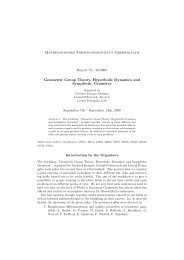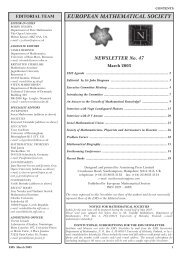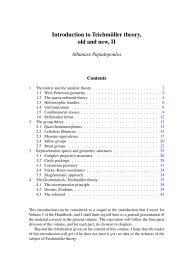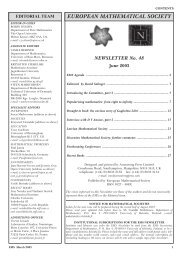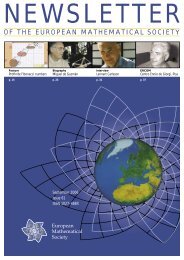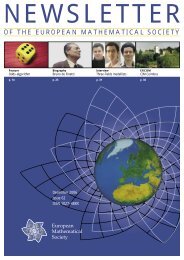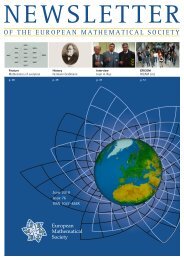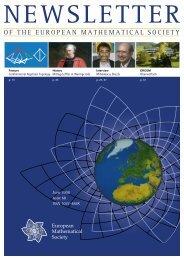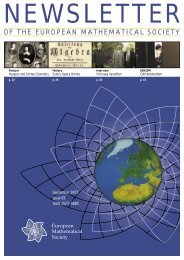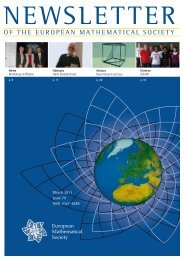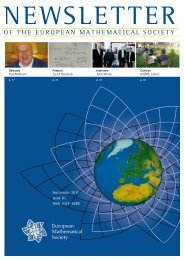New from Springer - European Mathematical Society Publishing ...
New from Springer - European Mathematical Society Publishing ...
New from Springer - European Mathematical Society Publishing ...
Create successful ePaper yourself
Turn your PDF publications into a flip-book with our unique Google optimized e-Paper software.
Communicating mathematics:<br />
a historical and personal journey<br />
Robin Wilson<br />
Robin Wilson at his inaugural lecture.<br />
This article is adapted <strong>from</strong> the author’s recent inaugural<br />
lecture as Professor of Pure Mathematics at the<br />
Open University, UK.<br />
My topic is ‘Communicating mathematics’: something we<br />
all try to do through our various teaching activities and<br />
publications.<br />
I was fi rst directed to think about what this involves<br />
by a 1990 examination paper for an Open University history<br />
of maths course, which I was studying as a part-time<br />
OU student. While sweating it out in the exam room I<br />
saw Question 15 that began: Describe some of the ways<br />
in which mathematicians have communicated their results<br />
to each other. My enjoyment in answering this question<br />
has led me over the past eighteen years to think about<br />
the various ways in which we communicate mathematics<br />
– to our students, to our colleagues, and to the general<br />
public.<br />
I won’t be able to cover every form of communication<br />
we use, but here are some ways that maths has been<br />
The spoken word<br />
Feature<br />
propagated over the centuries. As you can see below, I’ve<br />
divided my presentation into two main parts: the spoken<br />
word, on everything <strong>from</strong> lectures and TV broadcasts<br />
to casual conversations in the corridor, and the written<br />
word, on everything <strong>from</strong> research papers and books to<br />
newspaper articles and websites. In each part I’ll try to<br />
give both a historical and a personal account, with a wide<br />
range of examples covering 4000 years.<br />
Part I: The spoken word<br />
Inaugural lectures<br />
It seems appropriate to begin with inaugural lectures,<br />
which historically seem to be mainly of two types: those<br />
that present and explain original research in a wider context<br />
than is usually possible, and others (such as this one)<br />
that are more of an expository nature.<br />
An example of the latter was that of Christopher<br />
Wren, appointed at age 27 to the Astronomy Chair at<br />
Gresham College, who noted that London was particularly<br />
favoured with so general a relish of mathematicks<br />
and the liberal philosophia in such measure as is hardly<br />
to be found in the academies themselves and concluded<br />
by enthusing that <strong>Mathematical</strong> demonstrations being<br />
built upon the impregnable Foundations of Geometry<br />
and Arithmetick are the only truths that can sink into<br />
the Mind of Man, void of all Uncertainty; and all other<br />
Discourses participate more or less of Truth according as<br />
their Subjects are more or less capable of <strong>Mathematical</strong><br />
Demonstration.<br />
An example of the former type of inaugural lecture<br />
was G. H. Hardy’s 1920 presentation as Savilian Professor<br />
of Geometry in Oxford. Hardy was interested in an old<br />
number theory result of Edward Waring, that every positive<br />
whole number can be written as the sum of at most<br />
inaugural lectures fi lms and plays classroom teaching<br />
casual conversations TV documentaries tutorials and classes<br />
university seminars radio programmes video- and audio-tapes<br />
maths society meetings summer schools podcasts<br />
talks to high schools competitions conference talks<br />
The written word<br />
research monographs popular books exams and assignments<br />
clay tablets and papyri e-mail messages conference proceedings<br />
correspondence research papers newspaper articles<br />
manuscripts the internet correspondence texts<br />
EMS <strong>New</strong>sletter March 2009 15


